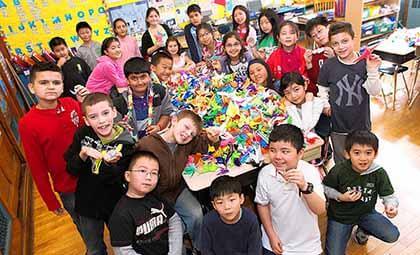By Rich Bockmann
Laurie Oates’ third-grade classroom at PS 159 in Bayside was full of origami cranes last week: blue cranes and gold ones, some big and some small, cranes made out of smooth, thin origami paper and some made of pieces of salvaged cardboard.
The colorful, traditional Japanese paper sculptures — 2,720 in total — sat strewn across groups of children’s desks prior to being packed away and mailed off in the school’s effort to help rebuild tsunami-stricken Japan.
Oates said “1,000 paper cranes” was a project she had first done with the Girl Scouts soon after 9/11. Every year, children throughout the world fold 1,000 origami cranes and string them together.
“If you don’t string them together, the wind will blow them away,” said Emily Tan, who is known to be one of the most precise folders in her class.
When completed, the cranes are sent to the Children’s Peace Monument at Hiroshima Memorial Peace Park in Japan. Atop the monument sits a bronze statue of Sadako Saski, a girl who died at the age of 12 from the leukemia she developed after the atomic bomb fell on Hiroshima.
As she lay in her hospital bed, she attempted to stave off death by folding 1,000 paper cranes; a Japanese legend says anyone who does so will be granted one wish. According to the museum’s web site, Sadako finished folding all 1,000 before she died, and since then children have sent their paper works of art to the monument to express their wish for world peace.
In January, Oates thought the project would be perfect for her enrichment group at the school at 205-01 33rd Ave.
“I wanted them to get out of it a message of peace around the world,” said Oates. “They were shocked to find out that America bombed Japan. They know it was a long time ago and they understand the message of peace.”
The 10 students in the enrichment group began working on the project once a week, and by early March the 1,000 cranes were packed up and ready to be sent to Hiroshima. Then, on March 11, a tsunami struck Japan and the class was not able send their cranes. With boxes of them lying around, Oates did not know what to do with them.
She called the Japanese consulate and the Japan Society in Manhattan, but no one was accepting 1,000 delicately folded pieces of paper. A parent of one of her students suggested she send them to the Bezos Family Foundation, which will donate $2 for every crane to Architecture for Humanity, a nonprofit that assisting with the reconstruction of Japan.
“They’re going to fix up homes, stadiums and schools — everything that was destroyed by the tsunami,” said Parmida Moradi-Motlagh.
Oates said she and her students set an obtainable goal of $5,000 and soon enlisted the whole school. Her enrichment students began to teach all the other classes the 22 folds necessary to make an origami crane. Oates said every one of the approximately 500 students at the school folded at least one. In just about a month the school had folded 2,720 for a total of $5,440.
Last Thursday, the class showed them off before they sent them out. Oates said origami paper is not only expensive, but scarce.
“I remember one weekend I went to four different Michael’s,” she said. So her students started grabbing whatever they could — loose-leaf paper, wrapping paper, Post-It notes — and kept on folding. They showed off different techniques and how a precisely folded crane will flap its wings once the head and tail are pulled on.
“The more you fold it, the more your fingers hurt,” said Jordan Karafiol, who added he can fold about “10, 9 or 11” before he needs to take a break. Jeffrey Shi, who does origami at home with his brother, is the fastest in the class, with a record of 20 cranes in 20 minutes. The students were excited to show off their knowledge of the art form and were knowledgeable about the message conveyed by their actions.
“They have an understanding of things that go on in the world,” said their teacher. “I wanted to teach them that everybody has a responsibility to help other people.”
Reach reporter Rich Bockmann by e-mail at rbockmann@cnglocal.com or by phone at 718-260-4574.


































